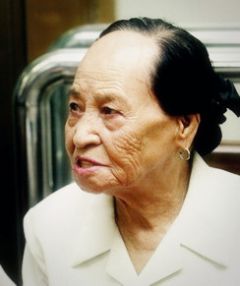Wan Aihua
Wan Aihua (万爱花), the WWII sex slave who was the first to openly accuse the Japanese military of committing atrocities during the war, passed away on Wednesday at the age of 83 in northern China's Shanxi Province.
Wan was born Liu Chunlian on January 1, 1930, in Jiucaigou Village, Heliger County of northern China's Inner Mongolia Autonomous. In 1937, she was sold as a child bride to Yangquan Village, Yuxian County of Shanxi Province. In June 1943, a 14-year-old Wan, together with four other Chinese girls, was captured by Japanese invaders and subsequently gang raped. Twenty days of atrocious violence later, Wan managed to escape. She was re-captured twice.
On an icy-cold day in early 1944, Wan was abandoned by Japanese soldiers at the Wuhe River bank close to their fortified point. By the time she was found by local Chinese villagers, she had severely been violated by the Japanese soldiers, with fractures of her thighs and ribs, broken ears and her overall body deformed. Due to muscular atrophy, her height had reduced from 1.65 meters to 1.47 meters. Genital ulceration eventually led to lifelong sterility.
After her husband passed away, Wan adopted a girl. They wandered from place to place, making a living by begging, mending and washing clothes for others, and acting as nannies. They finally settled down in Taiyuan, capital city of Shanxi Province. Due to her physical disability, Wan had to be taken care of by her adopted daughter. Local governments also provided her with financial support and charity funds.
In 1992, Wan became the first to publically come forward and testify that she had been a sex slave of the Japanese army during WWII. She openly accused the Japanese military of committing atrocities. Over the past two decades, she had repeatedly been to Tokyo to testify in different courts and attended international accusation meetings, demanding the Japanese authorities to face history, admit to their crimes, apologize to her and compensate her for the violence endured. Although Wan's attempts in court failed, war victims across China started to come out of the woodworks and accused the Japanese army of committing atrocities and appealed to the Japanese authorities for apologies and compensation.
Wan died on September 4, 2013, in Taiyuan. Her funeral was held on September 8 in Yangquan Village, Yuxian County of Shanxi Province, where she had lived. Wan's adopted daughter, Li Ladi, said that her mother had died with no final words.
"I will continue to file lawsuits against the Japanese authorities to help fulfill my mother's wish," Li said.
